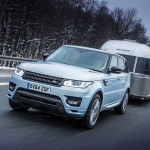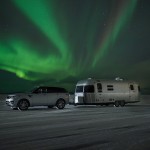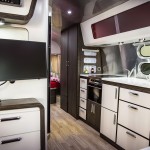In a dramatic real world test of the Range Rover Sport Hybrid’s capability, the car towed the 13.1m long Airstream through some of the worst winter weather Scandinavia has experienced in living memory. Gales, record snow depths and freak icy road conditions tested crew, car and trailer to the extreme.
More European Airstream owners choose Land Rover products to tow their ‘silver bullets’ than cars from any other manufacturer so the Range Rover Sport Hybrid and Airstream made an excellent match.
Setting off from Land Rover’s Design and Engineering Centre at Gaydon in the English Midlands, the team headed to Mengerskirchen in Germany, where a specially winter-modified travel trailer was waiting for them at Airstream Europe’s headquarters.
Top of Airstream’s European range of trailers, the 684 is 8.25m of boutique hotel suite on wheels, with two double beds, satellite television and Corian surfaces in both its fully-equipped kitchen and spacious bathroom. Thus specified, and once the team had packed their kit on board, the Airstream weighed in at more than 2.5 tonnes. For the Range Rover Sport Hybrid, that sort of weight proved no problem, whatever the weather did.
Throughout, the Range Rover Sport Hybrid demonstrated its astonishing towing prowess. Land Rover has applied for 20 patents for the Vehicle Supervisory Control system that manages the operation of the hybrid powertrain and its sophistication enables the electric motor’s 170Nm of torque to be blended in seamlessly, and contributes to a mighty 700Nm of vehicle torque. This delivers even stronger and more precisely controllable performance, which proved itself very useful, time after time, when towing this large and heavy load through such extreme weather.
En route, the team had to cross the five mile long Øresund Bridge, which was being lashed by the tail end of Hurricane Ole. Gale force sidewinds would have deterred those in lesser machinery but the Range Rover Sport Hybrid benefits from the same Trailer Stability Assist that more conventionally powered stablemates do. Braking each wheel individually based on what is happening to the trailer, any incipient sway is dealt with within milliseconds of it starting – well before it becomes an issue.
Off-road, the car proved its worth too, repeatedly pulling the trailer up and down snowy and often dangerously icy hills, and along forest tracks without fuss. Ben Samuelson, who led the team, added:
“We were closely watching the long range weather forecasts before we set off but nothing prepared us for how bad it got. However, time after time, it was only as we got out of the car that we realized quite how treacherous it was outside.”
Further north, as temperatures plummeted to minus 22 degrees centigrade outside, both the vehicle and the trailer’s cold-climate capability and comfort ensured that driver, passengers, and indeed those cooking and sleeping in the trailer each evening, experienced nothing but unruffled luxury.
The demanding cold-weather facility at Arjeplog in northern Sweden is the winter proving ground for the full range of Land Rover’s all-terrain vehicles. For four months every year, the company’s corps of engineers pitch vehicles to their limits against extreme winter conditions with temperatures which have been known to reach minus 39 degrees in daytime, but can plummet as low as minus 42 degrees centigrade overnight. Phil Talboys, who manages the Arjeplog test facility, commented:
“The Range Rover Sport Hybrid has gone through the same gruelling test and development regime that all our cars do. This journey just goes to show that the Range Rover Sport Hybrid is pure hybrid – with all the capability and versatility that you’d expect from a Land Rover.”
Source; Land Rover



